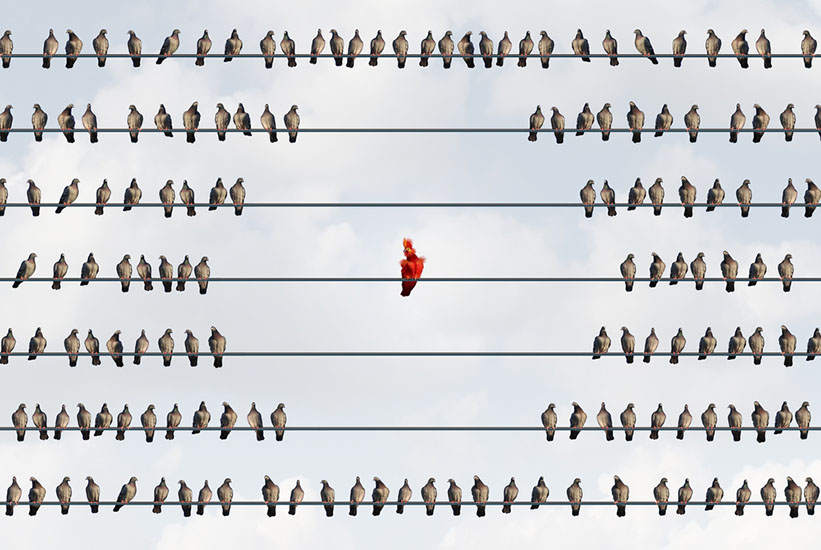In an article published in JAMA Network Open, Bernice Pescosolido and her colleagues examine the stigma around mental illness in the United States between 1996 and 2018. The researchers used survey data from 4129 participants to trace the changes in prejudice and discrimination towards people diagnosed with a mental illness.
The current research produced mixed findings, with decreases in public stigma towards depression and increases towards other diagnoses. They also noted a troubling increase in public perceptions of likely violence from people diagnosed with schizophrenia. The authors write:
“This survey study found the first evidence of significant decreases in public stigma toward depression. The findings of this study suggest that individuals’ age was a conservatizing factor whereas being in the pre–World War II or millennial birth cohorts was a progressive factor. However, stagnant stigma levels for other disorders and increasing public perceptions of likely violence among persons with schizophrenia call for rethinking stigma and retooling reduction strategies to increase service use, improve treatment resources, and advance population health.”

Research has linked stigma and discrimination towards people diagnosed with a mental illness to essentialist thinking, the assumption that an underlying essence makes things what they are. Similarly, researchers have linked stigma and discrimination to the biomedical model of mental health. The adoption of this model, which views mental suffering and behavioral abnormalities as caused principally by underlying biological issues, has led to a lack of clinical innovation and poor mental health outcomes for service users.
Stigma around voice hearing has been linked to isolation, secrecy, and poor functioning. This is true even in the absence of diagnosis. Stigma also seems to effect the experience of hearing voices, with distressing voices being much more common for people that had adverse experiences around voice hearing. In other words, people who are treated poorly for hearing voices tend to hear more disturbing voices.
Anti-stigma campaigns have had mixed results, with some researchers arguing that they do more harm than good. Sociologists have argued that anti-stigma campaigns that do not address the social causes of mental distress have limited impact. Anti-stigma campaigns can also hinder discontinuation of psychotropic drugs by insisting that mental illness must be treated, most typically with dangerous medications.
Research has found that viewing mental illness on a spectrum rather than as a binary significantly reduces stigma. Similar research has found that psychosocial explanations of psychosis (for example, that psychosis is principally caused by adversity rather than biology) reduces stigma.
The current research examines survey data collected from 4129 participants using the General Social Survey (GSS) in 1996, 2006, and 2018. The GSS collects representative data from noninstitutionalized adults in the continental United States. The GSS presents participants with a short story of someone meeting DSM diagnostic criteria for diagnosis of major depression, schizophrenia, or alcohol use disorder against a “daily troubles” control vignette. It then asks questions concerning causes of the behavior, perceptions of likely violence, and desire for social distance.
Between the years of 1996 and 2006 there was a significant rise of biomedical attributions for mental illness, meaning respondents were likely to understand mental illness as a brain disease rather than a reaction to poor environments or difficult circumstances. This coincided with a decrease in stigmatizing attributions. However, this did not effect the level of social rejection towards people with diagnoses.
Between the years of 2006 and 2018 the researchers saw a significant decrease in stigma around depression. Respondents across the board expressed less desire for social distance from people diagnosed with depression, including in professional settings. However, the same was not true of schizophrenia and alcohol dependence. Levels of social rejection remained consistent for both categories. Perceptions of the danger associated with people diagnosed with schizophrenia increased during this time, as did moral attributions for alcohol use disorder.
The authors note that the changes they saw in this research were not specific to certain demographics, meaning the changes were likely societal rather than generational or cultural.
The authors acknowledge several limitations to the current research. The responses reflect attitudes towards mental illness, not actual behavior. It is possible respondents could act against their self-reported attitudes in real-world circumstances. The study also had issues with decreasing response rates. Over the 22-year period of the study, responses decreased by 16%. The authors conclude:
“The societal and individual effects of stigma are broad and pervasive. Stigma translates into individual reluctance to seek care, mental health professional shortages, and societal unwillingness to invest resources into the mental health sector. Yet, the research, teaching, and programming resources targeted to redress prejudice and discrimination remain a low priority, small in scale, and individually focused. With indications that the level of stigma may be reducing, strategies to identify factors associated with the decrease in stigma for depression, to address stagnation or regression in other disorders, and to reach beyond current scientific limits are essential to confront mental illness’s contribution to the global burden of disease and improve population health.”
****
Pescosolido, B. A., Halpern-Manners, A., Luo, L., & Perry, B. (2021). Trends in Public Stigma of Mental Illness in the US, 1996–2018. JAMA Network Open, 4(12), e2140202. https://doi.org/10.1001/jamanetworkopen.2021.40202 (Full text)















I have always loved stigma.
It is the badge of the free thinker. It is the trailing robe of the drop out. And looking around at “society” right now there is much to recommend doing anything that might gingerly incur a burst of stigmatization from the priests of “consensus normal”.
Research Research Research. I am sick and tired of it. Research is a liar. Research is a liar who tells strangers what the matter with them is. Research is a liar who tells strangers that there is now nothing the matter with them. Research is some type of GOD. Perhaps Research is the…
“Sovereign Imperial Majesty God of Logic”…
to whom we must all quiver and kneel.
Psycho social explanations have NO relevance to my schizophrenia. NONE.
I have been homeless for five years. I have been a wealthy home owner. I have known fortune, feast and famine. I have been loved beyond measure and despised beyond endurance. I have been busy and productively employed and I have been more indolent than a dripping faucet finally fixed. I have had too many friends and I have had only a pet sparrow as a friend. I have had an Etonian style boarding school education. I have had no schooling at times when my mother lived on the road. I have been deliriously happy in most of my life. None of these changes had ANY bearing on my ILLNESS.
MY SCHIZOPHRENIA IS NOT DEPRESSION.
My schizophrenia is caused by my quirky body. It is hereditary in my case since my grandmother was a very real inmate of Bedlam Hospital in England.
This article uses the word “research” with no specific description of the “research” apart from a few blandished dates.
I could ask why antipsychiatry is bothering wading chest deep in all this “research” rather than building beautiful Soteria houses.
The 2006 research fragment has it that the understanding of mental illness AS A BRAIN DISEASE resulted in a DECREASE OF STIGMA.
Before the lights flash and I get arrested for saying the brain word and the disease word let me reitterate that I am NOT for ANY treatment of either. Not unless it was made by the moon and stars and wind and rain and comes unearthed from a dung heap behind a tribal hut.
Having a brain DOES NOT mean a ticket to bad treatment and damage and bullying. Having a disease does not mean that either. Not unless you live in a society that speaks…
“For your own good and we did the research to prove that you are a LIAR”.
Between 2006 and 2018 the research shows a decrease in depression stigma.
Depression is not a “feeling”. Depression is the near total absence of “feeling” anything but listless and dead inside. Depression is a manhole lid that a person applies to their troublesome “feelings” so that they do not incur the shame from society of having tumultuous “emotions”. It does not surprise me one bit that in our terrifying apocalyptically dour “society” that nobody is “feeling” anything at all but hollowness. And the increase of this pandemic of depression would result in it becoming so commonplace that you would look odd to marvel at it and stigmatize it.
The schizophrenic meanwhile is likely to look peculiar if they are writhing with akathesia and talking in tongues. Prudish “logical” society likes its citizens to appear “thoughtful” and “incisive”. At times some depressed persons look brooding over introspective topics, but the schizophrenic and the alcoholic may at moments look utterly thoughtless in their fervid “feeling” states.
Society likes to corral the overly emotional because that is it’s job. There are a billion sidewalks in the world yet modern neanderthal man is not allowed to wallow in his deep “feelings” and recline on any of those “spoken for” public byways because the “emotional” must always ask permission from “consensus normal”. When was the last time you rolled luxuriously on a manhole cover on a sidewalk? A patch of grass in a park maybe, but a street? You are simply not allowed to extend your emotions into the environment because it is not yours to “feel”. Instead you must scurry on home and switch on the computer and find your environment by becoming a hologram viewing the hologram documentary of wildlife. A person who dances on a sidewalk is seen as a danger to uptight rational society and this is why it stigmatizes. It is not that the person with psychosis is stigmatized for having a brain disease it is that they are wild on such a brain disease. Anyone gone crazed on hallucinogenic brain altering drugs is unpredictable at times and the public would be savvy to be sensibly cautious.
I am trying to understand what is meant by the word stigma. My reticence around its popular echo is that any group of bullies can use the crusade against stigma as a noble piece of propaganda…
“All for your own good”.
We have seen in history that bullies may purport to be merely wanting to raise you up out of your comfort zone, after telling you that it is not comfortable.
Not comfortable for whom?
The bullies perhaps inform you that you are marginalized and discriminated against. But again, excluded from whose vision of a world are they talking of? Is it “normal society”?
What is meant by “normal society”?
It seems to be an interminable pizza fight as to whose version of society we all have to en mass be beholden to.
You would WANT to be stigmatized out of a society that lets babies in Africa shrivel in starvation. You would WANT to be stigmatized out of a society that is careening over a cliff of climate change whilst they sit shirking at the air quality inside the drum of a jumbo jet.
It is a good article all told but the article cites a difference between “stigma” and “social rejection”. I could wear my “logical” mitre and ask what the differences between these terms are. I could even ask for research to be brought for my inspection, as I wipe contentious grease from my righteous lips with an embossed papal serviette. But I mislike my penchant to fall into a kind of bickering, rational tit for tat. It is immature and never ending. I mislike it and yet I am immature and can’t get enough of it. I pick at the grain of truth like its an irresistable tear in wallpaper, or a knee scab almost healed.
Here’s the thing!
If you are writing you are not well.
This is my conclusion for myself and most anyone else. Writing is a bad sign.
It means you are not being an animal. Animals love everybody. Animals do not write. Animals do not bicker. Animals just don’t care.
Truly, Madly, and Deeply,
DW.
Report comment
If we could get the truth out about the fact that the antidepressants and antipsychotics can create “psychosis,” via anticholinergic toxidrome. Plus the ADHD drugs can also create “psychosis.” Then perhaps the stigma surrounding “psychosis” would end. The bottom line is, “psychosis” is something the psychologists and psychiatrists create, with their drugs.
Report comment
I respect your view. I would only say that because one in one hundred people suffer greatly from schizophrenia this means there will be ninety nine people who DO NOT have schizophrenia who might think they know everything about it enough to claim what it is and is not. In life there will always be ninety nine people against every one unique individual who is struggling with ghastly intrusions of a hallucinatory sort. To me THAT is stigma. Telling others what they have going on inside of them.
There are many bipolar disorder people and schizophrenic people who are quite happy with their psychologist or psychiatrist or psychotherapist or social worker and know that their caring professionals DID NOT slip schizophrenia or bipolar disorder into their drinks since the conditions began long BEFORE these people made and appointment or met their caring professional.
This is not my attempt to disagree with what you say about the problem of medications. I totally agree with you that medications are deeply damaging billions of people. But I cannot concur with your notion that some scurilous doctor gave me my psychosis. Other people are free to think that their doctor did just that if they believe it or find that idea healing and supportive for them.
Report comment
I wonder why studies like this always leave out borderline and other “personality disorder” diagnosis. No one can argue with the fact that these diagnoses are highly stigmatized. In my experience, borderline is the most highly stigmatized psychiatric diagnosis.
Report comment
Yeah, but they are stigmatized by the psychiatric “profession” itself, and they don’t want to talk about THAT!
Report comment
I agree that the stigma comes from the profession, but then it’s amplified by society. There are many books, websites, reddit pages, social media accounts, etc that are devoted to disseminating “information” about borderline and narcissistic personality disordered people (it’s best if they have a diagnosis slapped on them from the experts but it’s not necessary. Anyone can diagnose anyone in their life with a personality disorder. It’s perfectly acceptable.)
The “information” is that these people are evil, untreatable, incurable, destroy lives etc.
It’s really quite out of hand. In the past (when I was still in treatment and after I had been slapped with a borderline label) if I ever complained about the things I read about the diagnosis they had given me and what people within the profession and outside it said about people with the DX, I was just told that I had too much time on my hands and it was my fault for reading whatever it was I read.
It became very apparent with the Amber Heard trial that the stigma has gotten much worse.
Report comment